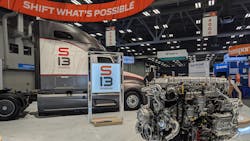Navistar resurrects finance co. to support fleets’ powertrain transformations
AUSTIN, Texas—Navistar is resurrecting its captive financial services to support the recent launch of the S13 Integrated Powertrain and to help its fleet customers transition to battery-electric vehicles.
Navistar Financial Corp.'s retail capabilities will serve International truck and IC Bus customers with customized, competitive loan and lease financing, the OEM announced this month. The new financial services organization will be able to adapt to meet the changing needs of Navistar customers in the evolving transportation landscape, Patti Brault, VP of sales for Navistar Financial, told FleetOwner during American Trucking Associations’ Management Conference & Exhibition.
“The timing of bringing back NFC was very much meant to align with the launch of the S13,” Brault said, “and also to have us in a mature state as we get ready to move into the BEV space. We’ve said that the S13 will be the last heavy-duty internal combustion engine that we launch. With new technology, it’s really important to have a captive finance company that’s there to support that launch.”
See also: Navistar's new truck includes OEM's final internal combustion engine
She explained that the options for fleet customers are competitive loan and lease financing that include fair market value (FMV) leases to mitigate ownership risks associated with new technologies. “At the end of the lease, they have the option of returning the truck, assuming it means it meets certain conditions,” Brault said. “So they don't actually own it. They're only paying for the piece of the truck that they're using—or the depreciation that they're actually driving.”
Brault said this would allow fleets to acquire new equipment without committing to owning the newer technology, such as the S13 powertrain. “Then, secondarily—and probably most importantly—is that we have a captive finance company available as Navistar leads the transition to sustainable technology,” she explained. “As we start to help our customers move into the battery-electric space, having a captive finance company is really important to that because the ecosystem is different. It's not just that you pull the truck into a different gas station."
“All the ownership ramifications of moving into BEV, whether it be the charging infrastructure, getting the right power into the building, or charger warranties, there's a lot of things that are just different,” she continued. “The operating environment for a BEV truck is different. Having a captive finance company there to help bundle those offerings is going to be important, and we do have ambition to lead that transition to sustainable technology. So we needed a captive finance company in place to do that.”
Traton Financial backing
It’s been over two years since Germany-based Volkswagen Group subsidiary Traton acquired Navistar. Navistar Financial will be part of Traton Financial Services, leveraging the global brand, according to Navistar Chief Executive Mathias Carlbaum.
"With the backing and financial strength of the Traton Group, Navistar Financial will provide a holistic and comprehensive buying experience for our customers, especially when it comes to meeting future requirements, like the transition to battery-electric vehicles," he said earlier in October.
See also: International S13 Integrated Powertrain set for vocational applications
Navistar Financial offers customers new and used equipment ownership and leasing options, including truck bodies and vehicle modifications, extended service contracts, and service solutions, and it will soon extend to insurance offerings and preventive maintenance contracts.
“We offer flexible payment plans to address individual customers’ cashflow concerns, so we understand that whether it be a bus contractor, who only runs nine months of the year, or a construction company that can only operate a few months of the year, we can just skip payments for those months where they're not bringing in,” Brault told FleetOwner.
She added that the financial services can include step-up payments for fleets ramping up operations. A dump operator, for example, could be starting in on a contract but won’t be up and running for a month or two and isn’t expecting payment for another month or more. “We can do step-up payments, where the initial payments are lower, to help him get to the point where the unit actually has brought money in, and he can afford to make a payment.”
Brault added that Navistar Financial wants to understand the business of its individual customers and craft solutions to help them succeed. “Setting up a payment plan that he can afford—or doesn’t match his cash flow—doesn’t make sense,” she said. “What’s the point?”
About the Author
Josh Fisher
Editor-in-Chief
Editor-in-Chief Josh Fisher has been with FleetOwner since 2017. He covers everything from modern fleet management to operational efficiency, artificial intelligence, autonomous trucking, alternative fuels and powertrains, regulations, and emerging transportation technology. Based in Maryland, he writes the Lane Shift Ahead column about the changing North American transportation landscape.

